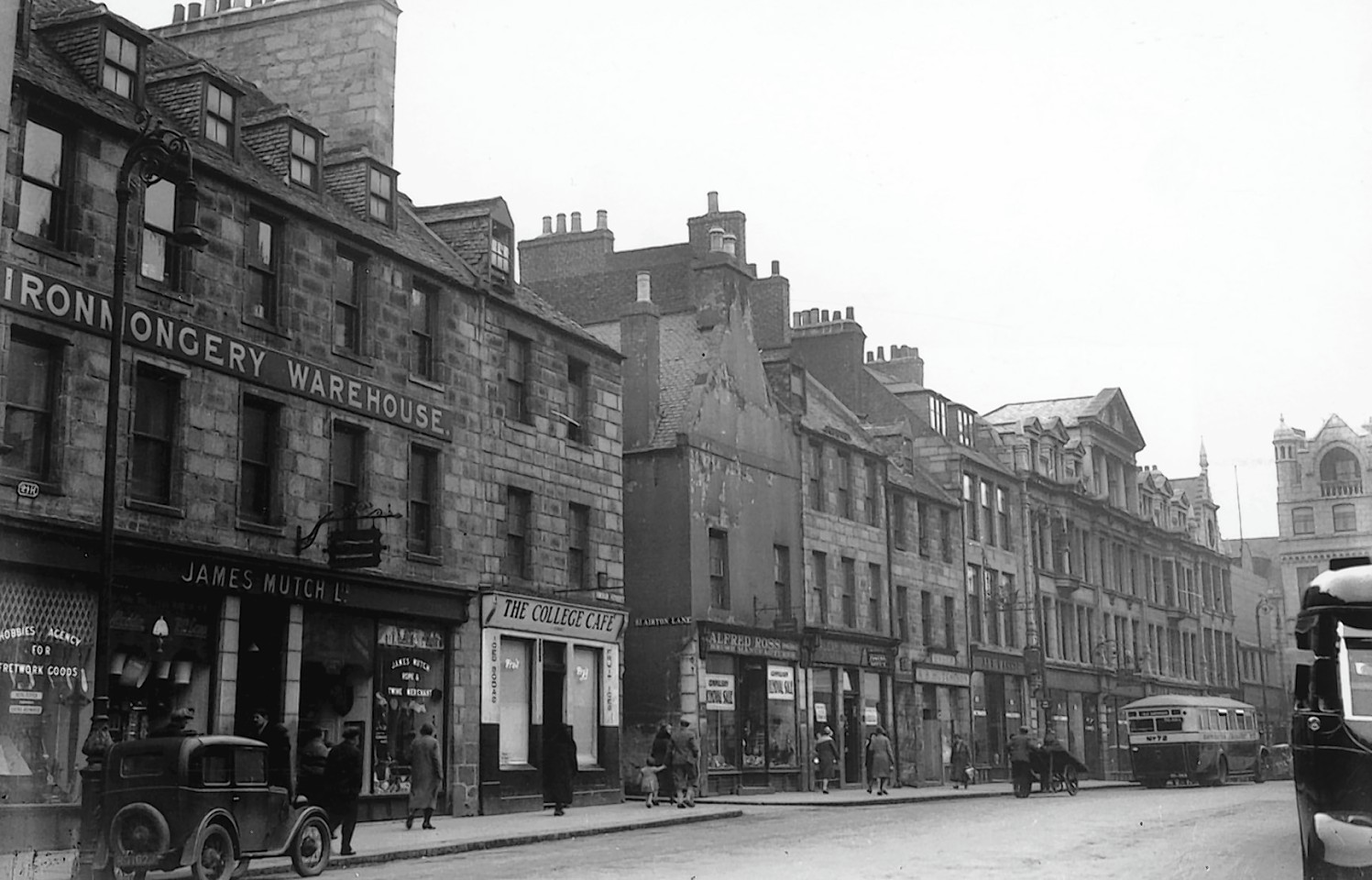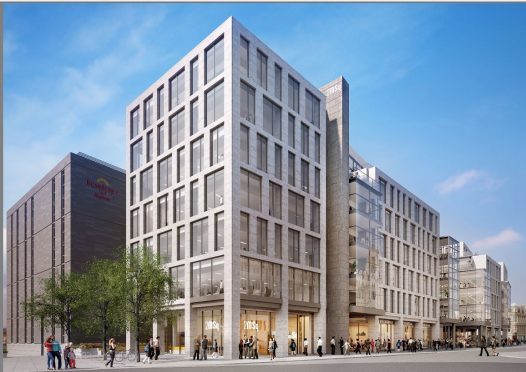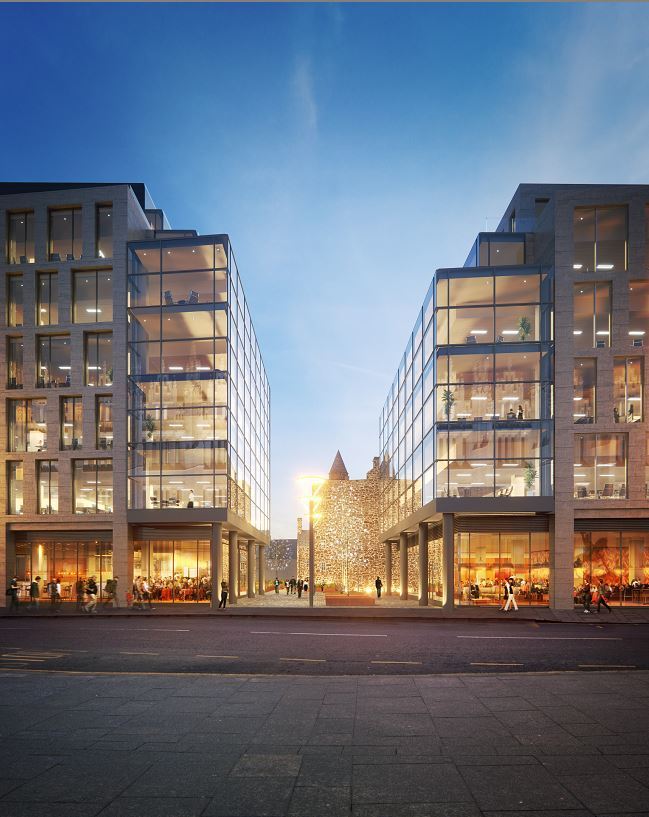The Press and Journal is on the verge of an historic move back home to the heart of Aberdeen.
Aberdeen Journals Ltd, publishers of the P&J and Evening Express, is poised to be among the first tenants to move into the £107million Marischal Square development on Broad Street when it opens next year.
The move will bring the paper back to the city centre – just a stone’s throw from its former offices, where it was printed from 1894 until it moved to the Lang Stracht in the 1970s.
Taking a top floor of the development, with commanding views of Marischal College, Provost Skene House and Schoolhill, the offices will allow staff in editorial, digital, advertising, marketing and commercial to work in a modern environment, in the heart of the town.
Detailed negotiations are still taking place with developers Muse, but it is hoped the business could be in the new offices by next summer – the year of the P&J’s 270th anniversary.
Last night, the chairman of parent company DC Thomson said the proposed move would be a “great opportunity” while council leader Jenny Laing described it as a “genuine boost” towards the regeneration of Aberdeen city centre.
Since May 2013, both papers have been printed in Dundee after a new multimillion system was installed at DC Thomson’s base, leaving the print hall in the Lang Stracht lying empty.
It is estimated that bringing the 1970s building – which is leased from the city council – up to standard would cost millions.
However, the firm’s highly success digital arm Brightsolid will continue to operate from Mastrick.
Chairman Andrew Thomson said: “We are excited to be considering a move back to the middle of the city.
“Aberdeen Journals has been based at the Lang Stracht for around 40 successful years but the potential to return to the centre of Aberdeen provides our newspaper teams with a great opportunity to be at the heart of the city once again.”
Aberdeen Journals’ editor-in-chief, Damian Bates, acknowledged the Marischal Square development had been controversial but said the proposed move was a “once in a lifetime” opportunity.
“Our primary concern is for the well-being of our colleagues and to provide us all with the best possible working environment,” he said.
“We know that Marischal Square has divided opinion, however it is clear it is being built and the facilities will be among some of the finest in the UK and beyond.
“It’s in no-one’s interests for it to sit empty and this is a once-in-a-lifetime opportunity for us to head back home; back into the city centre where we belong and where The Press and Journal started its amazing journey more than 270 years ago.
“We are now a multi-media business and this prospective move will provide a bright future for the Evening Express, P&J, Energy Voice and all our other products and sites. The council has been our landlord since approximately 1970 so nothing is going to change.
“There’s still a long way to go before a deal is done and we can start to plan any kind of move, but the overwhelming belief of the staff at Aberdeen Journals is that this is a move we’re all incredibly excited about.”
If the deal goes through, the business would join the Marriott Hotel group and All Bar One as confirmed tenants.
Aberdeen City Council is currently working on its 25-year masterplan for the city centre, which will breathe new life into area through a range of proposed projects, including pedestrianising Broad Street and Union Street, and creating a public square at Castlegate.
Council leader Jenny Laing said: “The Press and Journal and Evening Express are two of the best regional dailies in the country and seeing them move back to their spiritual home of Broad Street, and be at the cutting edge of Aberdeen City Council’s regeneration of the city centre, will send a strong signal to its readers and other stakeholders that it believes in the programme of change taking place here.”
Russell Borthwick, chief executive of the Aberdeen and Grampian Chamber of Commerce, described Marischal Square as an “integral part” of plans to improve the city.
He said: “Aberdeen Journals is a major regional employer with historic and respected brands and its decision to commit to the Marischal Square development is a welcome boost for the project and a clear demonstration of its continuing commitment to the region.
“Attracting such a high profile organisation can only be good news for the economy and we hope that other businesses soon follow suit.
“In a case of ‘what goes around, comes around’ Aberdeen Journals staff will return to Broad Street over 40 years after their predecessors moved out from there to Lang Stracht.”
Marischal Square: Who else is moving in?
Aberdeen Journals is not the first business to signal an intention to move into Marischal Square next year.
In April, it was revealed that pub and restaurant chain All Bar One have signed up to take 6,000sq ft on the ground floor.
It will be the chain’s third outlet in Scotland.
All Bar One joins international hotelier, Marriott, on the client list.
Last night Stephen Turner, regional director of Muse, Scotland, said: “Marischal Square is going to make a long-term positive impact on the local economy and it is extremely encouraging that major organisations like the DC Thomson Group, Marriott and the All Bar One Group have bought into a vision already shared by our development partners at Aberdeen City Council and Aviva Investors.
“The Press and Journal is quite rightly an ‘institution’ in this area, with superb backing from DC Thomson and a highly respected leader in Damian Bates, so their endorsement of what Marischal Square will bring to the city will be of significance in our search for additional high profile tenants for the development.”
Under the complex PFI-type deal the council struck with Muse, the authority will pay the developer £5million per annum for 35 years and keep the rates generated.
After the time period has elapsed, the council can buy the site for £1.
The council sold the former St Nicholas House site to investors Aviva in 2014 and received around £1million for the site up front. A further £9million will be paid after two years.

The P&J: Back to where it used to be
Broad Street was once the beating heart of Aberdeen’s journalism industry and had a reputation in the city akin to London’s Fleet Street.
The Press and Journal of today started life as Aberdeen’s Journal in 1747 when King George II was on the throne.
By the death of its second editor, James Chalmers II, in 1810, the P&J had reported on the American war of independence, the French revolution, the abolition of slavery and the battle of Trafalgar.
Numerous rivals tried to steal the paper’s crown in the 19th century but all from the Aberdeen Observer to the Aberdeen Star fell to the wayside.
But it was a £10,000 legacy left by the last surviving grandchild of first editor James Chalmers that had long-lasting ramifications of the city’s newspaper industry for decades to come.
The money was left in 1890, and by 1894 the firm were printing their first papers at Broad Street.
As technology developed, the company installed a private wire between the London office and the Granite City base.
On August 9, 1902 the Journal produced the first colour newspaper in Scotland to mark the coronation of Edward VII and by 1908 the first pool car had been purchased to ferry reporters around town.
By 1910 the company expanded into the adjourning premises at 24 Broad Street.
In 1922 another historic landmark was reached when the Journal amalgamated with the Aberdeen Free Press to form the Press and Journal.
With World War II on the horizon, anti-bomb measures were installed on the building but never tested by the Luftwaffe.
During the six years between 1939 and 1945 not a single delivery was disrupted by enemy activity.
The reputation and circulation of the paper continued to build, and the board decided a new custom-built base was required for both the Press and Journal and Evening Express to replace the crumbling but much loved Broad Street offices.
Lorry loads of newsprint arriving in the city centre were causing traffic chaos and in 1970 the company and city council signed an agreement to exchange Broad Street for a site on the council-owned Mastrick Industrial Estate.
By 1970, staff had all transferred to the site on the Lang Stracht.

